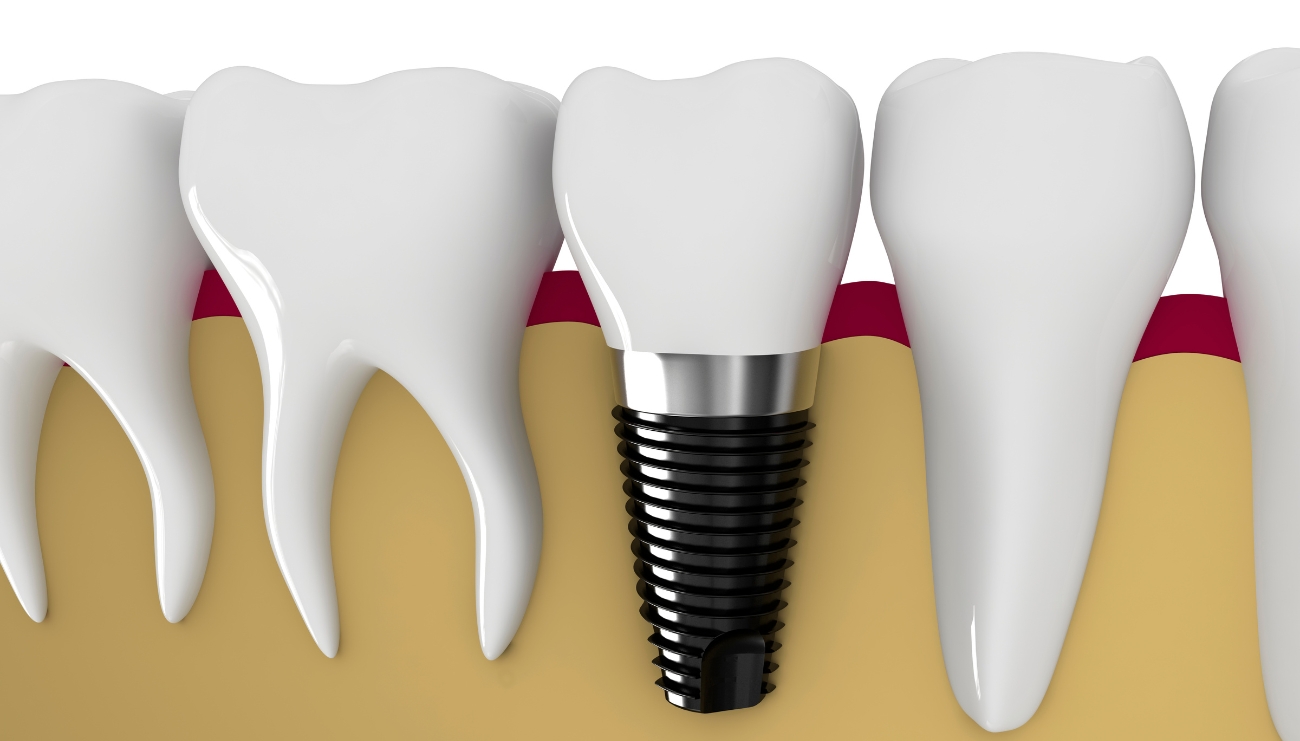
Orthodontic treatment
Dental Implants
A dental implant is an “artificial root” that is surgically placed into the jawbone, in order to support a replacement tooth or multiple teeth in place.
Dental implants are made of biocompatible materials, such as titanium and zirconia, which allow the fusion between the implant and the jawbone, a process called osseointegration.
Dental implants are a popular and effective option for people who have lost teeth and they can provide a long-lasting and natural-looking solution for restoring a healthy smile.

Dental Implants
A dental implant is an “artificial root” that is surgically placed into the jawbone, in order to support a replacement tooth or multiple teeth in place.
Dental implants are made of biocompatible materials, such as titanium and zirconia, which allow the fusion between the implant and the jawbone, a process called osseointegration.
Dental implants are a popular and effective option for people who have lost teeth and they can provide a long-lasting and natural-looking solution for restoring a healthy smile.
When are Dental Implants used?
Dental implants are used to replace one single missing tooth or multiple missing teeth:
1. after tooth extraction due to:
- root fracture
- unrestorable cavities
- periodontal disease
- failed root canal treatment
2. to replace genetically missing teeth (agenesis)
3. lost teeth due to injury
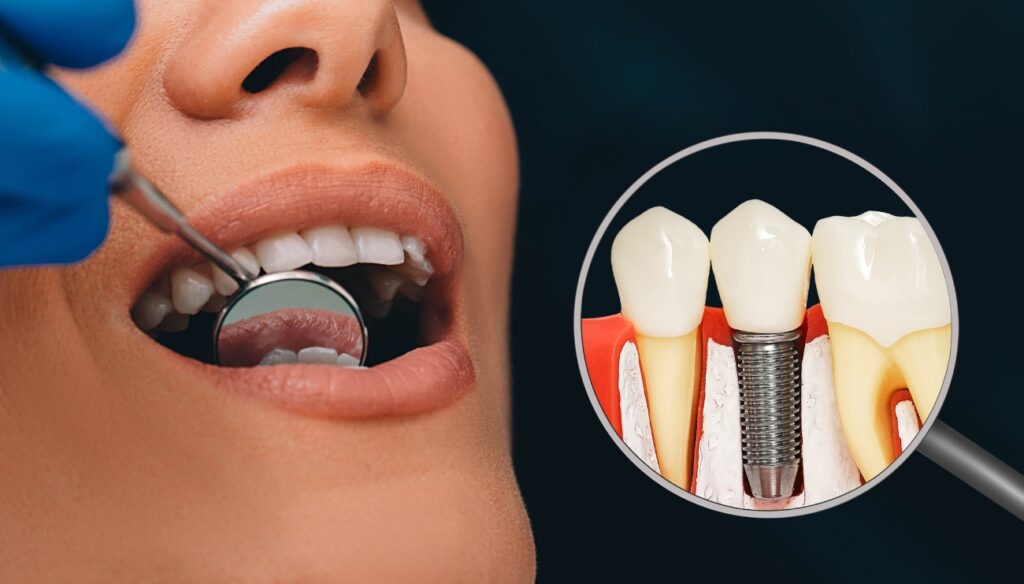

When are Dental Implants used?
Dental implants are used to replace one single missing tooth or multiple missing teeth:
1. after tooth extraction due to:
- root fracture
- unrestorable cavities
- periodontal disease
- failed root canal treatment
2. to replace genetically missing teeth (agenesis)
3. lost teeth due to injury
How does dental implants work?
The process to create state of the art, natural looking implants to replace a missing tooth happens in three stages:
How does dental implants work?
The process to create state of the art, natural looking implants to replace a missing tooth happens in three stages:
1. Assessment
In our opinion, the diagnosis and treatment planning stage is of the upmost importance to achieve the best result for each patient. During the first appointment, at our dental clinic in the Sydney CBD, we will understand all your concerns and expectations, and then present you with options on how to achieve the desired result with dental implants.
In this appointment we will perform a dental examination and take 3D radiographic image (CBCT) to assess the jawbone and surrounding tissues. Healthy gums and enough bone in the jaw, to hold the implant, are needed for a successful treatment.
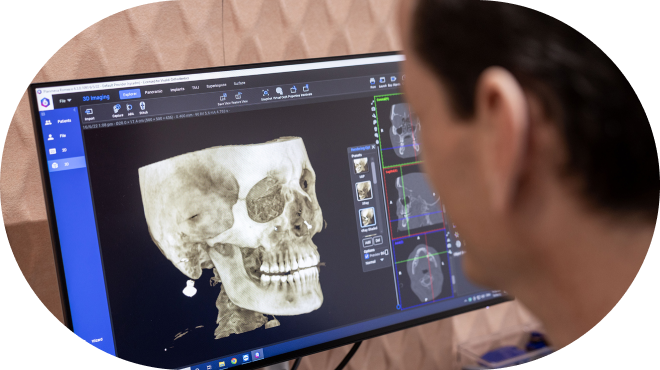

1. Assessment
In our opinion, the diagnosis and treatment planning stage is of the upmost importance to achieve the best result for each patient. During the first appointment, at our dental clinic in the Sydney CBD, we will understand all your concerns and expectations, and then present you with options on how to achieve the desired result with dental implants.
In this appointment we will perform a dental examination and take 3D radiographic image (CBCT) to assess the jawbone and surrounding tissues. Healthy gums and enough bone in the jaw, to hold the implant, are needed for a successful treatment.
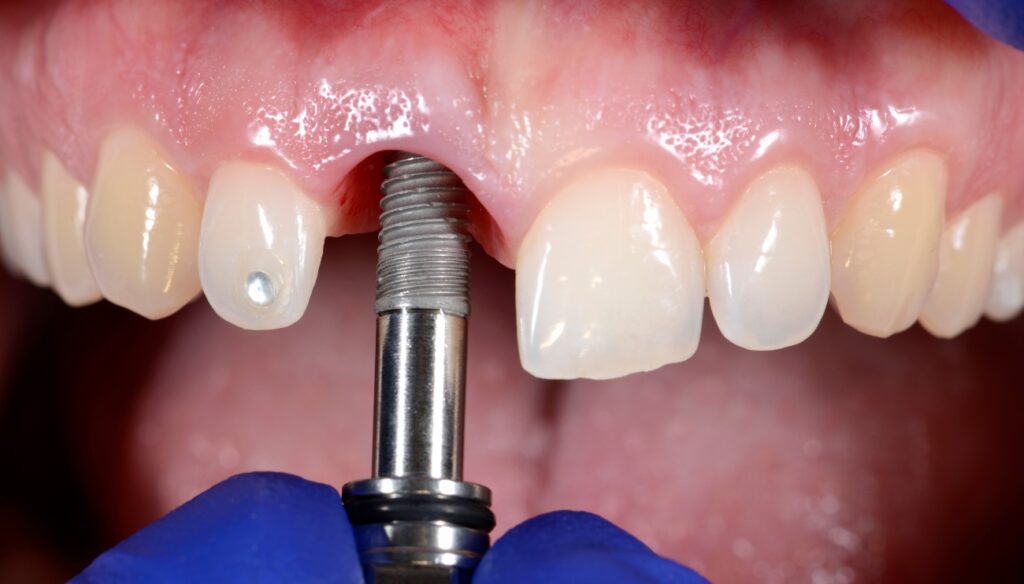
2. Surgical Stage
The second visit of the dental implant process is when the implant are placed into the jawbone. It is a minor operation, which is usually performed in the dental surgery under local anaesthetic, for single implant placement. For multiple implants, a day surgery facility and sedation might be recommended.

2. Surgical Stage
The second visit of the dental implant process is when the implant are placed into the jawbone. It is a minor operation, which is usually performed in the dental surgery under local anaesthetic, for single implant placement. For multiple implants, a day surgery facility and sedation might be recommended.
3. Restorative Stage
At the final stage, usually 2-4 months after the surgical stage, once the implant is fully integrated to the bone, a ceramic crown (or bridge for multiple teeth) will be attached to the implant(s).
Final adjustments are then made to ensure that the new crowns are both functional, comfortable – and of course – look amazing!
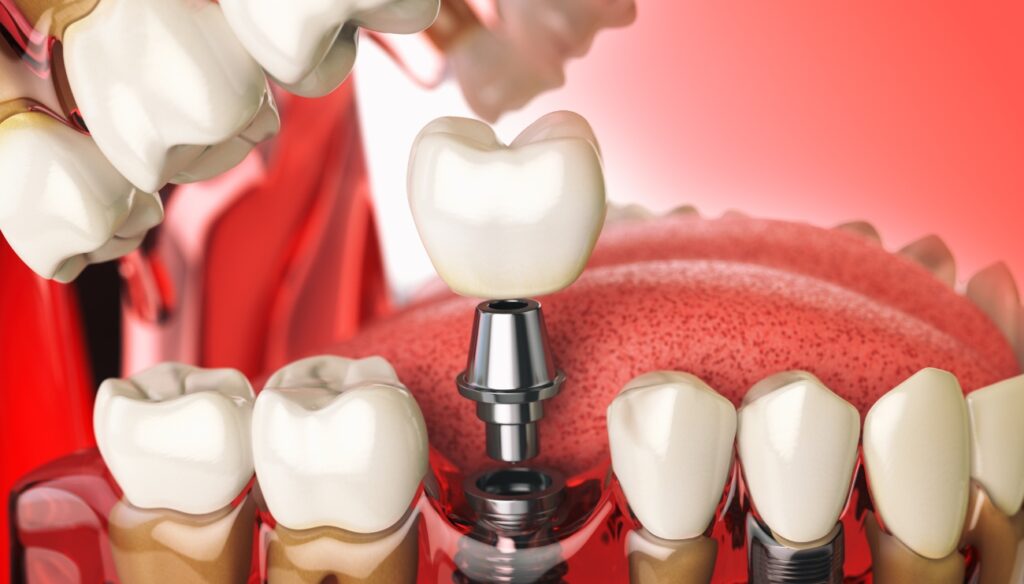

3. Restorative Stage
At the final stage, usually 2-4 months after the surgical stage, once the implant is fully integrated to the bone, a ceramic crown (or bridge for multiple teeth) will be attached to the implant(s).
Final adjustments are then made to ensure that the new crowns are both functional, comfortable – and of course – look amazing!
Review
Usually, a review appointment is booked with two weeks after cementation to reassess, make any adjustments needed and take the final photographs of your new tooth.
Review
Usually, a review appointment is booked with two weeks after cementation to reassess, make any adjustments needed and take the final photographs of your new tooth.
Implants F.A.Q.
Am I a good candidate for dental implants?
If you’re someone who has lost one tooth, multiple teeth, or all of your teeth, dental implants could be a viable option for you. To find out if they’re right for your individual needs, be sure to book your initial consultation.
What are the advantages of dental implants?
As humans, we’re fortunate to have two sets of teeth – baby teeth and permanent teeth. However, when tooth loss occurs as a result of dental decay or gum disease, dental implants can now serve as a permanent and reliable replacement, effectively becoming the third set of fixed teeth. Not only can dental implants last a long time, but they can also enhance your appearance, boost your confidence, and allow you to enjoy your favorite foods and activities without any concerns about your teeth. Made of titanium, dental implants are impervious to dental decay, providing a long-lasting solution for your oral health needs.
What are the disadvantages of dental implants?
As with any minor oral surgical procedure, there is a slight risk of infection, inflammation, and discomfort involved with dental implant placement. However, we will work with you to develop a plan to manage these potential complications based on your specific needs. In cases where there is insufficient bone to support the implant, bone and gum grafting procedures may be necessary, which can raise the overall cost of treatment. Nonetheless, the initial investment in dental implants can ultimately prove worthwhile in the long run.
How much do implants cost and does insurance cover the cost?
When it comes to replacing a single tooth, the cost of a dental implant is comparable to that of a traditional fixed bridge. Depending on the specifics of your situation, dental implant treatment may qualify for coverage under some insurance plans, though this varies widely. Ultimately, the cost of treatment will be dependent on factors such as the quantity of bone in the area. We will provide a personalized assessment based on your individual needs to help determine the best course of action.
Do Dental Implants last?
One major advantage of dental implants is that, unlike natural teeth, they are not susceptible to dental decay. Nevertheless, the continued health of your gums is critical to ensuring long-term implant success. In addition to conscientious oral hygiene practices at home, routine professional cleanings and check-ups are essential to maintain the sustainability of your dental implants. Because each patient is unique, success hinges on a comprehensive diagnosis and treatment plan that takes into account factors such as medical history and individual needs.
Is there a payment plan?
We offer flexible payment plans to make treatment affordable.
Implants F.A.Q.
Am I a good candidate for dental implants?
If you’re someone who has lost one tooth, multiple teeth, or all of your teeth, dental implants could be a viable option for you. To find out if they’re right for your individual needs, be sure to book your initial consultation.
What are the advantages of dental implants?
As humans, we’re fortunate to have two sets of teeth – baby teeth and permanent teeth. However, when tooth loss occurs as a result of dental decay or gum disease, dental implants can now serve as a permanent and reliable replacement, effectively becoming the third set of fixed teeth. Not only can dental implants last a long time, but they can also enhance your appearance, boost your confidence, and allow you to enjoy your favorite foods and activities without any concerns about your teeth. Made of titanium, dental implants are impervious to dental decay, providing a long-lasting solution for your oral health needs.
What are the disadvantages of dental implants?
As with any minor oral surgical procedure, there is a slight risk of infection, inflammation, and discomfort involved with dental implant placement. However, we will work with you to develop a plan to manage these potential complications based on your specific needs. In cases where there is insufficient bone to support the implant, bone and gum grafting procedures may be necessary, which can raise the overall cost of treatment. Nonetheless, the initial investment in dental implants can ultimately prove worthwhile in the long run.
How much do implants cost and does insurance cover the cost?
When it comes to replacing a single tooth, the cost of a dental implant is comparable to that of a traditional fixed bridge. Depending on the specifics of your situation, dental implant treatment may qualify for coverage under some insurance plans, though this varies widely. Ultimately, the cost of treatment will be dependent on factors such as the quantity of bone in the area. We will provide a personalized assessment based on your individual needs to help determine the best course of action.
Do Dental Implants last?
One major advantage of dental implants is that, unlike natural teeth, they are not susceptible to dental decay. Nevertheless, the continued health of your gums is critical to ensuring long-term implant success. In addition to conscientious oral hygiene practices at home, routine professional cleanings and check-ups are essential to maintain the sustainability of your dental implants. Because each patient is unique, success hinges on a comprehensive diagnosis and treatment plan that takes into account factors such as medical history and individual needs.
Is there a payment plan?
We offer flexible payment plans to make treatment affordable.
If you’re ready to start smiling more, come and visit us in our Sydney CBD dental clinic



